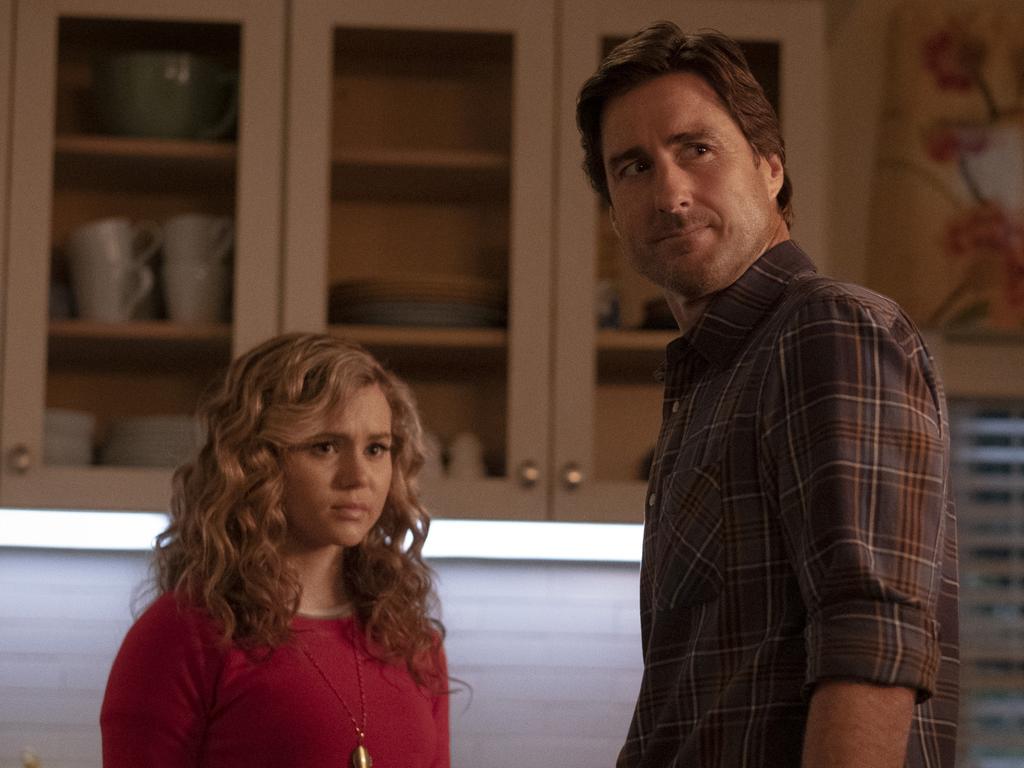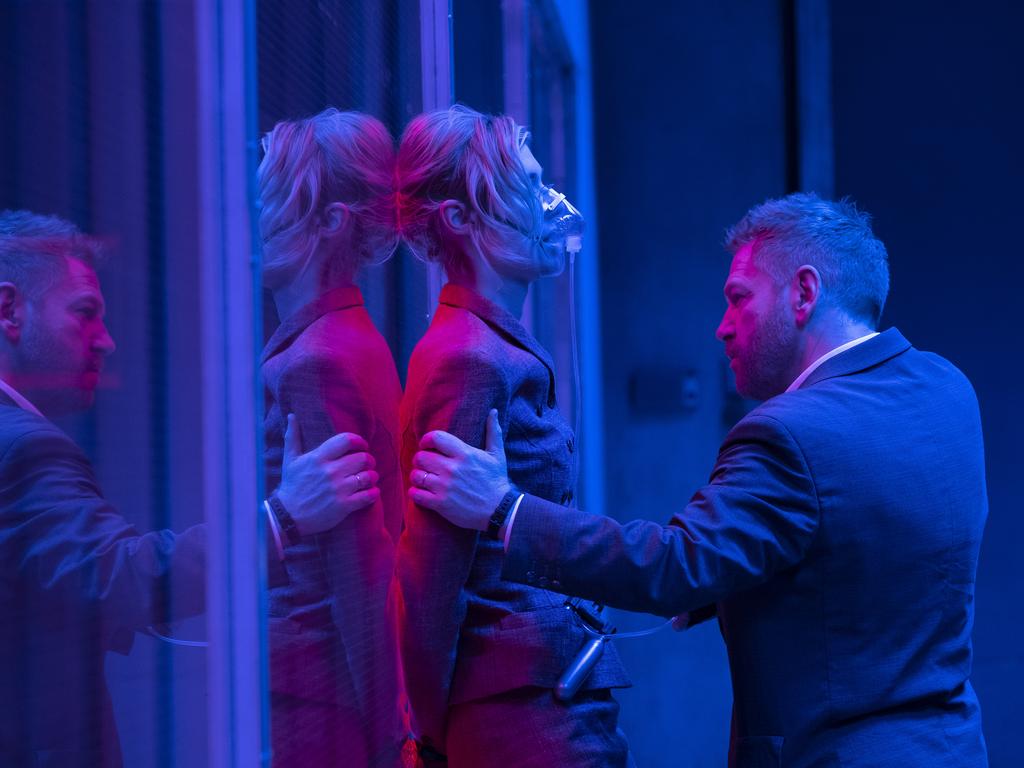In Halifax: Retribution LaPaglia is one-dimensional and Gibney understated
Nine’s resurrection of the successful Halifax f.p is devoid of cinematic surprises.

It’s a time when local drama production is under terminal threat and the once ritual pleasures it offers us in familiarity and regularity might very well become part of the past.
But there’s a light in the darkening tunnel, possibly a gesture of reassurance.
Nine have resurrected the successful Halifax f.p., in which Rebecca Gibney was the immaculately coutured forensic psychologist, a criminologist working at the intersection between psychiatry and the criminal justice system. Across 21 telemovies she was retained by the police and the legal system, revealing the reasons behind abhorrent acts, those seething undercurrents of rage, grief and injustice.
Halifax: Retribution reunites Gibney with the show’s original creator-writer Roger Simpson, an industry legend who has created 16 other series for TV, and the establishing director is the redoubtable and dependable Mark Joffe, whose recent work includes episodes of A Place To Call Home and Jack Irish.
Halifax: Retribution starts in wonderfully pulpy style in a long pre-titles sequence, within seconds confronting us with the grotesque effects of hatred. Melbourne is alight with fireworks, some kind of citywide celebration, when a man aboard a river boat on the Yarra is gunned down by a sniper, a glass of champagne in his hand as he dies. Then soon after another man is shot down in the centre of the city, this time in daylight, blood splattering the wall behind him.
A well-compiled montage then juxtaposes scenes of the city on high alert, a rapid-fire mix of news reports and the sinister images of someone lovingly assembling a high-calibre sniper’s rifle with a long suppressor, an abstract study of bolts clanking into tubes, springs being compressed and cartridges threaded into magazines.
A third man is then shot, a waiter in some high-class restaurant in the city.
Then momentum slows and backstories unfold. The sniper has the police perplexed, there’s almost something supernatural about him, or her. No traces are left at the shooting site, apart from powder marks, and with so many reflecting high rises in the city, it’s difficult to even figure out where the shots come from.
Commander Tom Saracen, played by a grouchy Anthony LaPaglia, is a top cop from the US who joins the locals.
He is brusque, domineering and used to being obeyed. Flummoxed by the case and desperate for some kind of psychological profile, he calls on Gibney’s Halifax, an old acquaintance.
But, currently Professor of Forensic Psychiatry at Melbourne University, she has no interest in returning to crime.
There’s the academic career and also a loving long-term relationship with Ben Sailor (Craig Hall), a gifted musician, who makes classy guitars for rock stars. Halifax still suffers from panic attacks and nightmares. “I stayed too long,” she says of her former career.
But it all changes when she receives a note: “Beware Lovely Jane: For A Terrible Retribution Is At Hand”. Is Halifax being warned off or is the note an intimation or something more personal?
And then another shooting closer to home, horrifying and intimately linked to Halifax, forces her to join the hunt.
Simpson’s script sets up plenty of questions, the answers to which will obviously be revealed as the next five shorter episodes unfold. Is the killer a lone wolf, are terrorists involved, or is the unknown suspect with the rifle a cop or someone with military training? Are the frenzied attacks an attempt by the killer to assert himself in an increasingly complex and depersonalised world?

More obviously though, is this narrative of survival and vulnerability, a story we soon learn is packed with lies, betrayals and secrets, really about Halifax and her past?
The new Halifax is a decent piece of commercial TV drama but unlike the best of recent dramas brought to us on the omnipresent streamers, and there have been so many now, dense and multifaceted, it just doesn’t eschew naturalism and realism in a way that we have come to expect. The shows that excite tend to include a range of aesthetic strategies that serve both narrative and thematic functions but Joffe’s direction, though measured and thoughtful, is devoid of cinematic surprises.
The acting seems a little somnambulistic, Gibney so far too understated and LaPaglia too one-dimensional, odd for such an accomplished performer. The police procedural sequences are stilted and lack plausibility, a telling example of the way we’ve built organisations to ensure that justice is served that are ill-equipped to actually do so.
We are surely getting to the stage where, given the Black Lives Matter movement, it’s more problematic to accept the idea of the police as effective guardians of the public, continually and altruistically putting themselves in harm’s way.
Watching this revival – it certainly isn’t a so-called reimagining – is like wrapping yourself in a large cosy, comforting blanket.
It’s a reminder that until recently as David Simon wrote looking at The Wire, all TV was about selling, not the story but the intermission. “And therefore little programming that might interfere with the mission of reassuring viewers as to their God-given status as indebted consumers has ever been broadcast.”
But to be fair, some applause for Nine for featuring a locally produced drama when broadcast TV is now almost completely dominated by versions of reality TV: unscripted storytelling featuring contestants who play themselves with some vague connection to the real world. Most of them like raucous soap operas featuring people who can’t act being egged on and exploited by producers paid to exploit.
From the team that bought you the box office sensation Mrs Carey’s Concert, that wonderful documentary feature about the transformative power of great music, comes the equally beguiling Recorder Queen. Directed by award-winning Sophie Raymond, herself a respected singer-songwriter, this short irresistible film takes us deep inside the experience of recorder virtuoso Genevieve Lacey, her inspiring story, as her director says, defying “the almost universally uncharitable response to the recorder”.
Lacey, is a musician who, after appearing as a celebrated soloist around the world, premiering works written for her by a distinguished assortment of composers, returned to Australia to, in what she calls a painful surrender, let “go of the idea of perfection”.
Famous for what critics called her “combination of sensuality, wit and mind-boggling flamboyance,” she made the impossible seem easy with her range of instruments, a distinctive variety of end-blown flutes, and what she calls their “bird-like purity”.
But as she became “a formidable, steely, terrifying soloist” – her own assessment – she lost something of herself.
“The searing pressure of pace and perfection became an addiction,” she says in her wonderfully poetic meditative narration. “Life was reduced to drumming a vast quantity of notes into my body; I had become a note machine, an athlete, not an artist, and there was a reckoning.”

At home in the less charted terrain of Australia she discovered that her old world instruments were in fact young, and she “became part of something much older and bigger than I am”.
She learned to listen differently, unmasked, following no lines on a page. Now she creates what she calls “sanctuaries of sound” in a variety of artistic and cross-cultural contexts but there is still the beautiful quality of that recorder, something she calls “appealingly miserable, an allure of safety”.
Co-written by Lacey and Raymond, and seven years in the making, their witty and at times intensely moving script combines animation from Raymond and the clever Emma Kelly, dramatic reconstruction, documentary footage and live performance to explore the many altered states of a creative mind. The music is sublime, covering 10 centuries, and includes Bach, Vivaldi, Telemann, Elena Kats-Chernin, Paul Kelly and the Australian Brandenburg Orchestra. And Lacey is simply spellbinding, not only as she plays her recorders but in the range of characters she creates to flesh out her poetic biography.
Over the years Raymond painstakingly supervised a number of different camera operators, including the accomplished cinematographer Nicola Daley, who provides some stunning, evocative re-enactment scenes of Lacey as a child, recorder already wedded to her hands.
With some cinematic ingenuity the film takes us in and out of tunnels and dark spaces, memories and mental states suggestive of what Lacey calls her “hyperactive brain”, and the way she lives with music, constantly visited by sounds.
Raymond too conveys a thrilling a sense of momentum from the start, that propulsion to turn emotion into music that comes to Lacey at an early age when she falls in love with her recorder. There is a lovely device of animated birds that guide her journey and whimsical animation that takes us inside her music.
It’s a gorgeous collaboration of highly skilled artists and as Raymond says, Lacey’s intimate story is really “the framework for a bigger story about creativity and the creative artist – the commitment, courage, compromise, fear, vulnerability, and moments of absolute bliss.”
Halifax: Retribution, Tuesday, Nine, 8.45pm.
Recorder Queen, Sunday, ABC Compass, 6.30pm.




To join the conversation, please log in. Don't have an account? Register
Join the conversation, you are commenting as Logout